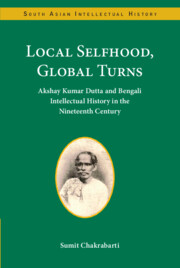 Local Selfhood, Global Turns
Local Selfhood, Global Turns Book contents
- Frontmatter
- Dedication
- Contents
- Acknowledgements
- Note on Transliteration
- Introduction
- 1 The Discontents of Eclecticism: The Milieu of Akshay Kumar Dutta
- 2 The New World of Science: Akshay Kumar Dutta as the ‘Science Worker’
- 3 The Tattwabodhini Period: The Conflicting Contours of Self-Fashioning or Towards a Global History?
- 4 Reconstructing Bengali Selfhood: The Conception of Dharma in Akshay and Bankim
- 5 On the Question of the Public Sphere: Civic Life, Polity, Dissent, and an Affective Engagement with the Janasamaj
- 6 Imagining Bharatvarsha: Identity, History, Nationhood
- Conclusion and Further Thoughts
- Bibliography
- Index
Introduction
Published online by Cambridge University Press: 30 June 2023
- Frontmatter
- Dedication
- Contents
- Acknowledgements
- Note on Transliteration
- Introduction
- 1 The Discontents of Eclecticism: The Milieu of Akshay Kumar Dutta
- 2 The New World of Science: Akshay Kumar Dutta as the ‘Science Worker’
- 3 The Tattwabodhini Period: The Conflicting Contours of Self-Fashioning or Towards a Global History?
- 4 Reconstructing Bengali Selfhood: The Conception of Dharma in Akshay and Bankim
- 5 On the Question of the Public Sphere: Civic Life, Polity, Dissent, and an Affective Engagement with the Janasamaj
- 6 Imagining Bharatvarsha: Identity, History, Nationhood
- Conclusion and Further Thoughts
- Bibliography
- Index
Summary
One would often, but not consistently, come across mentions of Akshay Kumar Dutta in discussions on the cultural and intellectual life of nineteenth-century Bengal. He would, on most occasions, be a cursory reference, a footnote, a character on the fringes of the larger rubric of the discussion. There was a great churning of intellectual frameworks throughout the nineteenth century in Bengal – religious and educational reforms, epistemic shifts, cultural upheavals, and much of all these have been documented with care by historians and social scientists alike. Akshay Kumar Dutta, however, has rarely featured as a crucial presence in these discussions and debates. This book asks the ‘why’ question by attempting to closely read some of his works and examine if such erasure has foreclosed possible complications to certain categories of critique.
Born on 15 July 1820 in the quiet hamlet of Chupi in Burdwan district, Akshay was the youngest and the only surviving child of Pitambar Dutta and Dayamayi Debi. His father worked as a cashier in Calcutta (now known as Kolkata), and Akshay's initial years were spent in Chupi, being educated in the local pathsala run by Gurucharan Sarkar. He also started learning Farsi with Munshi Aminuddin and Sanskrit with Gopinath Tarkalankar as a young boy while still at Chupi. His father, subsequently, took him to Calcutta, where, after a brief stint at a free school run by missionaries at Kidderpore, he was admitted to Gourmohan Auddy's Oriental Seminary. His father's untimely demise in 1839 did not allow him to finish his formal education, but as his biographers have documented, his love of learning led Akshay to train himself in both the sciences and the humanities and provoked him, at an early age, to contemplate on the epistemic disconnect between Puranic and European forms of learning. As Akshay grew up in Calcutta, the city caught in the middle of multiple reforms, he was introduced, through his visits to the Bangla Bhasanushilani Sabha (a forum for the spread and practice of the Bangla language), to the poet Iswarchandra Gupta, who was also incidentally the editor of the periodical Sangbad Prabhakar.
- Type
- Chapter
- Information
- Local Selfhood, Global TurnsAkshay Kumar Dutta and Bengali Intellectual History in the Nineteenth Century, pp. 1 - 17Publisher: Cambridge University PressPrint publication year: 2024


